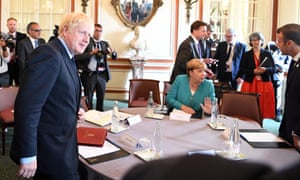
Britain will contribute £90m to a global fund that provides schooling for children in conflict zones, Boris Johnson will announce at the G7 summit on Sunday.
Education Cannot Wait is a global fund established in 2016: it is based at Unicef and overseen by a steering group chaired by Gordon Brown.
It is aiming to raise $1.8bn (£1.5bn) from governments and other donors by 2021, and supports education projects in 18 countries including Somalia and Afghanistan.
The UK has already contributed £35m to the fund since its establishment, though Denmark and Canada are the most generous contributors.
The additional £90m announced this weekend should help provide schooling for up to 600,000 children.
Reducing inequality is the overarching theme of the French-chaired G7, with gender inequality in education one of the issues on which president Macron is keen to see progress.
Johnson made girls’ education one of his pet projects when he was foreign secretary, and mentioned it as one of his three top priorities for the G7 summit as he landed in Biarritz.
Speaking at the summit on Sunday, he is expected to say: “Innocent children suffer the most from the brutal reality of life in the world’s most dangerous countries. I’m determined to ensure that all children have a chance to succeed – no matter where they are born. It is only through equipping the adults of tomorrow with learning and skills that we will break this cycle of instability.
“And it is girls that suffer the most, growing up in societies marred by violence. We owe them better. Girls’ education is the Swiss Army knife that solves a multitude of the world’s problems. Everyone benefits from a world where girls have the same opportunities as their brothers.
Education Cannot Wait also tries to promote the argument that education should be a higher priority among international donors.
Johnson will also urge his fellow leaders to spend more of their aid budget on promoting education.
Save the Children estimated in 2017 that 420 million children are living in conflict zones. In that year, the UK spent 8.9% of its aid budget on education – but the average figure globally, according to Education Cannot Wait, is around 2%.
When he was foreign secretary, Johnson was known to be keen to take closer control of the UK’s aid budget, and there were suggestions during the Tory leadership contest that he could fold the independent department for international development (DfID) into the foreign office.
[“source=theguardian”]



